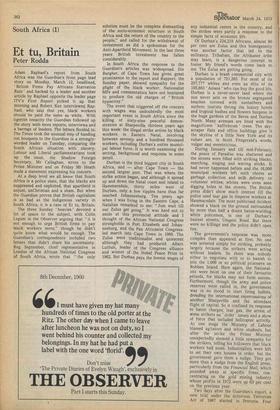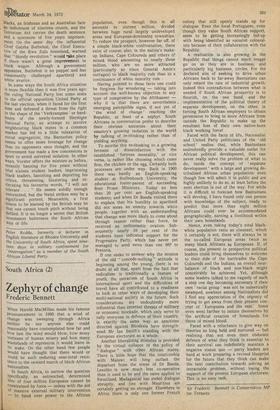South Africa (1)
Et tu, Britain
Peter Rodda
Adam Raphael's report from South Africa was the Guardian's front page lead story on Monday, March 12, headlined, 'British Firms Pay Africans Starvation Rate' and backed by a leader and another article by Raphael opposite the leader page ITV's First Report picked it up that morning and Robert Kee interviewed Raphael, who said that yes, black workers should be paid the same as white. With tigerish tenacity the Guardian followed up the story with more reports, interviews and a barrage of leaders. The letters flooded in. The Times took the unusual step of handing out bouquets to the Guardian in a stronglyworded leader on Tuesday, comparing the South African situation with slavery. Labour and Liberal parliamentarians took up the issue, the Shadow Foreign Secretary, Mr Callaghan, wrote to the Prime Minister and on Friday Mr Heath made a statement expressing his concern.
At a deep level we all know that South Africa is a police state, that the blacks are suppressed and exploited, that apartheid is unjust, unChristian and a sham. But when the Guardian proves that British capitalism is as bad as the indigenous variety in South Africa, it is a case of Et tu, Britain.
The three Sunday ' heavies ' devoted a lot of space to the subject, with Colin Legum in the Observer arguing that "it is not enough to urge British firms to pay black workers more," though he didn't quite know what would be enough. The Guardian's correspondence included two letters that didn't share his uncertainty. Reg September, chief representative in London of the African National Congress of South Africa, wrote that "the only solution must be the complete dismantling of the socio-economic structure in South Africa and the return of the country to the people," and called for the withdrawal of investment as did a spokesman for the Anti-Apartheid Movement. In the last three years British investment has fallen considerably.
In South Africa the response to the Guardian's articles was widespread. Die Burgher, of Cape Town has given great prominence to the report and Rapport, the Sunday paper, showed sympathy for the plight of the black worker. Nationalist MPs and commentators have not hesitated to produce the old charges of " British hypocrisy."
The event that triggered off the concern with wages was undoubtedly the most important event in South Africa since the killing of sixty-nine peaceful demonstrators at Sharpeville thirteen years ago this week: the illegal strike action by black workers in Eastern Natal, involving between seventy and a hundred thousand workers, including Durban's entire municipal labour force. It is worth examining the setting, background and response in some detail.
Durban is the third biggest city in South Africa, and — after Cape Town — the second, largest port. That was where the strike action began, and although it spread up and down the Natal coast and inland to Hammarsdale, thirty miles west of Durban, only a few ripples have thus far reached Johannesburg. Ten years ago when I was living in the Eastern Cape, a Natalian remarked to me: "Just wait till our Zulus get going." It was hard not to smile at this provincial attitude and I thought of the African National Congress strongholds in Port Elizabeth and Johan nesburg, and the Pan Africanist Congress led march into Cape Town in 1960. The Zulus were traditionalist and quiescent although they had prod.uced Albert Luthuli, leader of the Congress alliance and winner of the Nobel Peace Prize in 1962., But Durban pays the lowest wages of any industrial centre in the country, and the strikes were partly a response to the simple facts of economic life.
Of Durban's 224,219 Africans, almost 90 per cent are Zulus and this homogeneity was another factor that led to the militancy. Tribalism, the Afrikaner tribe may learn, is a dangerous concept to foster. My friend's words come back to me. The Zulus are getting going.
Durban is a brash commercial city with a population of 721,265. For most of its 257,777 whites and even an elite of its 195,883 ' Asians ' who can buy the good life, Durban is a never-never land where the sun never sets' on the bronze segregated beaches covered with sunbathers and surfers; tourists throng the luxury hotels and tropical bushes and flowers burgeon in the huge gardens of the Berea and, Durban North. Many avenues are lined with the magnificent ' kaffirboom ' trees. The skyscraper flats and office buildings give it the skyline of a little New York and its values are, in Scott Fitzgerald's words, vulgar and meretricious.
During January and till mid-February, the peace of Paradise was shattered and the streets were filled with striking blacks, marching, singing and waving sticks. It had never happened before and the 16,000 municipal workers left such chores as garbage collection and milk delivery to volunteer whites; whites were even seen digging holes in the streets. The British press didn't show much interest till the police used tear gas to disperse workers at Hammarsdale. The most publicised incident showed a black on the ground surrounded by more than half a dozen baton-wielding white policemen, in one of Durban's busiest streets, Umgeni Road. But there were no killings and the police didn't open fire.
The government's response was more complex than appeared at first. No one was arrested simply for striking, probably largely because the strikers were acting without lead.ers. So there was nobody either to negotiate with or to banish to join the 1,000 or so political prisoners on Robben Island. Here again, the Nationalists were hoist on one of their favourite petards, for blacks may not form unions. Furthermore, though the army and police reserves were called in, the government was in no mood to start firing bullets, dreading the international repercussions of another Sharpeville and the aittendant flight of capital. So it confined its response to baton charges, tear gas, the arrest of some strikers on ' order ' issues and a show of force that included helicopter activity. At one stage the Ministry of Labour blamed agitators and white students, but after the strike the Prime Minister unexpectedly showed a little sympathy for the strikers, telling his followers that black workers had souls. Industrialists were left to set their own houses in order, but the government gave them a nudge. They got more than a nudge from the English press, particularly from the Financial Mail, which pounded away at specific firms, con centrating on the gold mining industry whose profits in 1972 were up 63 per cent on the previous year.
Two days after the Guaridan,'s report, a new trial under the nctorious Terrorism Act of 1967 started in Pretoria. Four blacks, an Irishman and an Australian face an indictment of nineteen counts, and the Terrorism Act carries the death sentence and a minimum of five years imprisonment. On the same day the influential Chief Gatsha Buthelezi, the Chief Executive of the Kwa Zulu homeland, warned that "bloody revolution" would take place if there wasn't a great improvement in black wages. Although a government appointee, Buthelezi is no puppet and has consistently challenged apartheid and White avarice.
In some ways the South Africa situation IS more flexible than it was five years ago: the ruling National Party lost some seats to the official opposition United Party at the last election, when it faced for the first time and defeated a threat from the right in the shape of the ' Verkramptes ' or hardliners of the newly-formed Herstigte National Party; an attempt to involve neighbouring black states in a common market has led to a little relaxation of social segregation; the Bantustan policy seems to offer more leverage for change than its opponents once thought; and the government has made a few concessions in Sport to avoid universal isolation. In other ways, Vorster offers the mixture as before, recently banning for five years without trial sixteen student leaders, imprisoning black leaders, banishing and deporting his critics, threatening, blustering and reiterating his favourite words, "I will not tolerate . . . " He seems solidly enough entrenched, but the Natal strikes may be a Significant portent. Meanwhile, a first lesson to be learned by the British may be that one cannot touch pitch without being defiled. It is no longer a secret that British investment buttresses the South African Way of life.
Peter Rcdda, formerly a lecturer in English iiterature at Rhodes University and the University of South Africa, spent nineteen days in solitary confinement for interrogation' as a member of the South African Liberal Party



































 Previous page
Previous page